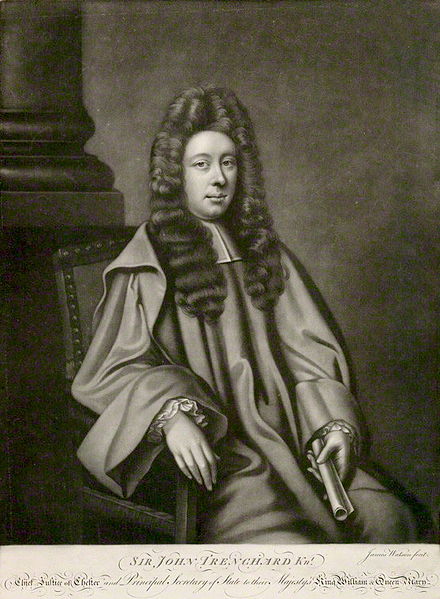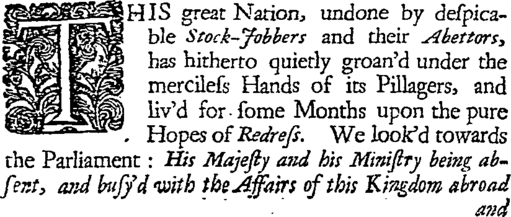Between November 1720 and December 1723, John Trenchard and Thomas Gordon wrote an extraordinary series of 144 weekly essays for the London Journal, taking their pen name, Cato, from the Roman statesman who had defied the emperor Julius Caesar.
Letters written by Trenchard, Gordon inspired understandings of free speech
Compiled in 1724 as a four-volume set, Cato’s Letters had gone through six printings by 1755; the essays frequently re-appeared in American periodicals.
Inflamed by corrupt corporations, warmongering politicians, and their flatterers, Trenchard and Gordon called for liberty, accountability, and checks upon the wealthy interests who manipulated government for their own ends.
No single work had as much direct influence on the revolutionary generation’s understandings of free speech and conscience as did Cato’s Letters.
Corrupt stock scheme involving Parliament inspired Cato’s Letters
Trenchard and Gordon made an unlikely pair. Trenchard, born in 1662, was a wealthy country gentleman several decades older and much wealthier than Gordon, a young Scottish lawyer and tutor. After striking up a friendship in a coffeehouse, they went on to write essays called the “Independent Whig,” attacking Episcopal “high church” pretensions. Their most important collaboration, however, was Cato’s Letters, which attracted a wide audience.
The occasion for the letters was the collapse in 1720 of the “South Sea bubble,” a corrupt stock scheme involving the South Sea Company, a trading operation with private stockholders, chartered by Parliament, and given monopoly privileges over trade with Spanish South America.
The company had been formed to help manage England’s public debts, which had been exacerbated by various royal military adventures. Debt certificates were convertible to company stock. Although the company produced nothing of value, its stock rose through speculation, pumped up by the company’s officers and the public officials they had bribed.
When the bubble burst, the directors fled the country. Cato called for vengeance: “what we can have of them, let us have; their necks and their money” (1995: 50).
Letters highlight importance of individuals fighting against tyranny
Cato’s Letters is a work of synthetic genius.
Although their ideas are not always original, Trenchard and Gordon create a seamless merger of Machiavelli’s republicanism, John Locke’s liberalism, and Algernon Sidney’s anti-authoritarian populism. The result is an impassioned defense of the industrious individual fighting against corporate privilege and the forces of “tyranny.”
As Gordon wrote in his preface to the 1724 edition, “Let us therefore … brand those as enemies to human society, who are enemies to equal and impartial liberty” (1995: 12). Trenchard asserted more specifically that “a free trade, a free government, and a free liberty of conscience, are the rights and blessings of mankind” (1995: 653).
For Cato, freedoms of conscience take priority over all others: “Whigs think all liberty to depend upon freedom of speech, and freedom of writing … there is often no other way left to be heard by their superiors, nor to apprize their countrymen of designs and conspiracies against their safety” (1995: 721).
Restricted speech is the hallmark of tyranny, since absolutists always promote “abject sycophancy and blind submission” (1995: 115).
Cato’s Letters gave first endorsement to necessity of ‘free speech’ about government
The First Amendment drew much of its language from Cato, who wrote that the people must be able “to represent their public grievances, and to petition for redress to those whose duty it is to right them” (1995: 178).
Historian Forrest McDonald points out that “free speech” was never a central political claim prior to the 1720s: “It was John Trenchard and Thomas Gordon … who first gave unreserved endorsement to free speech as being indispensable … and who were willing to extend the privilege to all, including those who disagreed with them” (1985: 47).
Following Machiavelli, Cato offers a deeply pessimistic account of human nature, skeptical of how the wealthy and powerful pursue self-interest at the public’s expense, while also expressing a constant faith in the goodness of “the people.”
As Gordon writes, “the people, when they are not misled or corrupted, generally make a sound judgment of things” (1995: 174). The people could be trusted to criticize government, even at risk of libel, a subject Cato tackles at length.
Cato: Government should not restrict criticisms on matters of state
Libels are “a sort of writing that hurts particular persons” and, unlike in modern American law, are “not the less a libel for being true.” Cato contends that “There are some truths not fit to be told…. But this doctrine only holds true as to private and personal failings; and it is quite otherwise when the crimes of men come to affect the publick” (1995: 228).
While individuals should ignore “the private vices or weaknesses of our governors,” Cato celebrates public accusation on matters of state, suggesting that any government restrictions on the press would have a dangerous chilling effect that could only benefit the corrupt and despotic (1995: 231–232).

Between November 1720 and December 1723, John Trenchard and Thomas Gordon wrote an extraordinary series of 144 weekly essays for the London Journal, taking their pen name, Cato, from the Roman statesman who had defied the emperor Julius Caesar. (Image of Trenchard via Wikimedia Commons, public domain)
While supporting religious liberty, Cato did not suggest a complete church-state separation
Cato’s advocacy of religious liberty was more complex and reflects the pragmatic compromises of his era.
Echoing Locke, Cato asserts, “Every man’s religion is his own … ; which action utterly excludes all force, power or government…. It is a relation between God and our own souls only…. Religion therefore, which can never be subject to the jurisdiction of another, can never be alienated to another, or put in his power” (1995: 414).
Yet tolerance for religious dissenters did not suggest a complete separation of church and state, and Cato defended England’s Episcopalian establishment that barred dissenters from public office.
The reason was political. Cato feared on practical grounds that any change would empower either the Catholics or Presbyterians, both of whom he saw as far more intolerant of dissent (1995: 588–593).
Letters influenced First Amendment in United States
Cato left a profound mark on the United States, including the anti-absolutist suspicions of the revolution, the defenses of free speech and conscience embodied in the Constitution, and the rowdy passions of Jacksonian democracy. Like the Jacksonians, Trenchard warned, “O Companies, Companies! ye bane of honesty, and ruin of trade; the market of [stock-] jobbers, the harvest of managers, and the tools of knaves, and of traitors!” (1995: 72)
For Trenchard and Gordon, liberty meant that “every cobbler can judge, as well as a statesman” (1995: 103). Freedom of speech, a “sacred privilege … so essential to free government” would lead to truth, and with it, all good things: peace, prosperity, the widespread ownership of property, and a government as good as its people (1995: 110).
This article was originally published in 2009. Robb A. McDaniel is an Associate Professor at Middle Tennessee State University.

